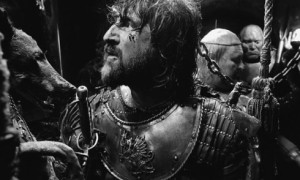 Of all the rebels in Russian cinemas, none were more radical than Aleksey German. During the Soviet era and afterwards, his films consistently defied authority and in return were denounced and censored. His final film, which took six years to make, and was completed right before his death two years ago at the age of 75, is called Hard to be a God. It’s undoubtedly his most defiant and his most difficult film. To call it astounding seems like an understatement, but what better word can I find?
Of all the rebels in Russian cinemas, none were more radical than Aleksey German. During the Soviet era and afterwards, his films consistently defied authority and in return were denounced and censored. His final film, which took six years to make, and was completed right before his death two years ago at the age of 75, is called Hard to be a God. It’s undoubtedly his most defiant and his most difficult film. To call it astounding seems like an understatement, but what better word can I find?
The movie has a science fiction premise, from a Russian novel of the same name. I may be in the minority in this view, but judging solely from the film, I think the premise is a mere stepping-off point for German. It’s only mentioned briefly in the voice-over that begins the film, and thereafter it would be an intrepid viewer indeed who could follow it. But here it is, briefly: a group of earth scientists have traveled to another planet with a culture stuck in something like our Middle Ages, a medieval era that does not experience a Renaissance. The strongest and cleverest of these earthlings, Don Rumata, ascends to a position of power in this culture, where he is considered a god, or something close to it.
Now, from here on in there are some rough correspondences with the novel, but German’s themes, having to do with power and its deadly grip on the soul, transcend any futuristic plot devices. For all intents and purposes we are in some feudalistic society, where the mass of people are ignorant peasants and slaves, and they serve a small ruthless class of aristocrats who dominate them by the sword.
Now I must say that no medieval society, or any society, actually lived like this or could have. Don Rumata, played by the enormously impressive Leonid Yarmolnik, tramps through a series of landscapes and structures (one hesitates to even call them houses), the atmosphere enveloped in a perpetual fog, punctuated by frequent rain storms, an environment steeped in mud, filth, excrement, blood, and who knows what else—the constantly roving camera encountering what seems like hundreds of weird-looking denizens, peasants and slaves whose stupidity can be both friendly and frightening. The frame of the film is always crowded with movement, guttural sounds, spitting, babbling, vomiting, gibberish, sudden violence and shock. A horror film like no other, it was all shot in a black and white that evokes death and decay, and with a production design defying close description.
German seems to have taken one of William Blake’s proverbs to heart: “Too much—or not enough.” At three hours, this relentless journey definitely falls on the side of “too much.” It’s as close as we’ll ever get to a film journey through hell, I suppose. The crushing brutality of Stalinist Russia was clearly on German’s mind, but the film is relevant to any authoritarian society, here boiled down to the essence of its madness. No art, no intellect, no privacy, no freedom, just naked domination of others in order to stay on top of the heap. Why show restraint when talking about this level of evil? German seems to say, I will show you the depths as far as it goes. You may laugh occasionally at the sheer grotesquerie of the imagery, but it’s the humor of those who’ve experienced the worst. Emerging obscurely from this chaos is the idea of God’s despair. The notion of a god controlling everything, like Don Rumata, results in anguish and affliction. This mysterious figure continues to hold the world at bay although he seems vulnerable and even has enemies—but he’s protected by an unspoken dread.
Hard to be a God is one of the most uncompromising films you’ll ever see. If you can take it, you won’t forget it.

